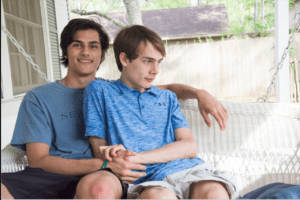Before you read on, make sure to check out Part 1 of our interview with Geraldine Bliss, the President and Co-Founder of CureSHANK and mother to Charles, who has Phelan-McDermid syndrome. Today, we’re going to talk about CureSHANK, the EL-PFDD meeting that takes place tomorrow (and how you can join in), and advice for newly diagnosed families.
Founding CureSHANK
As the patient community grew, Geraldine and another board member saw value in developing and launching an organization that was more focused on drug development. While she lauds the Phelan-McDermid Syndrome Foundation for all that they’ve done in regards to patient and family support, Geraldine wanted to begin an organization that would be narrowly focused on research. So she co-founded CureSHANK, which launched in 2019, with a very specific goal: to accelerate therapeutic development.
Soon after its founding, the pandemic happened, so much of the fundraising and meetings were put on hold. But this gave CureSHANK time to correspond with academic investigators, survey stakeholders on challenges in the field, and run a landscape analysis. Geraldine shares:
Our surveys came back with a strong signal to focus on de-risking clinical trials. Everyone referenced failures in other neurological conditions where we’re not getting a direct biological readout of what’s happening in the brain. Trials fail not because the drugs aren’t good but because the outcome measures aren’t ideal. So we’ve been focusing on outcome measures and biomarkers to create a smooth, flat runway for any companies coming into this space.
Some of CureSHANK’s projects include a video series called Real Family Stories and a pre-competitive consortium. “Real Family Stories” helps communicate the significant unmet need in PMS and intimately portray family experiences. Some of the topics include regression, self-injurious behaviors, hypotonia, and epilepsy. For the pre-competitive consortium, CureSHANK brings together companies that are interested in PMS to develop appropriate measures and biomarkers. Geraldine explains:
PMS is really complicated. Many of our patients have severe-to-profound intellectual disability. This makes it difficult to use regular measures of intelligence and functional or adaptive behaviors. With traditional outcome measures, there are floor effects. But if you can’t get a good measure of where someone is starting, it’s hard to measure the effects of treatment. There has been a bit of work on this already, but it still needs to be validated. Our hope is to have solid outcome measures for use in clinical trials.
The EL-PFDD Meeting
As explained earlier, CureSHANK is sponsoring an EL-PFDD Meeting on November 8, 2022 from 10am-3pm ET. During this meeting, parents will share their experiences and their child’s experiences with PMS and participate in a Q&A about the impacts of PMS and the need for treatments. Geraldine stresses that all members of the PMS community are invited to get involved:
There is an open invitation to join this meeting and share the voices of parents and caregivers. We want your voices to be heard. There are opportunities to participate through polling, calling in, and email comments. We’re also inviting other stakeholders to join. We want everyone’s input.
You may submit a comment on symptoms, impact, treatments, or other aspects of your experience prior to the meeting on the CureSHANK website. The website also gives you the opportunity to pre-register for the meeting and you can watch live the day of.
After the meeting is over, CureSHANK will develop the Voice of the Patient Report to capture all of the data. This will be sent to the FDA and made available as a public resource for other stakeholders, too. When they’re reviewing INDs or marketing applications, they can refer back to the report to put into perspective what PMS is like and the need for treatments.
Advice
When it comes to advice for families who are new to PMS, the first thing Geraldine said was to get involved and find a community. She shares:
It makes me sad to think that there are people who feel like they’re fighting this battle alone. Everyone should try to get plugged in with the patient community. There’s so much knowledge that so many families have learned the hard way.

She also shares that another piece of advice is to get involved and become an advocate. Geraldine shares:
Cultivate relationships with your child’s doctors and medical team. They probably don’t know much about PMS and you’ll be the one to educate them about it. For example, we’ve noticed some new symptoms with Charles and I talked to his doctor about it. I was able to direct him towards some recently published papers. This is a typical way that parents may need to advocate within the medical system. You can also be an advocate by participating in a clinical trial or joining research studies. These aren’t right for everyone, but participating can help move us towards treatments.


